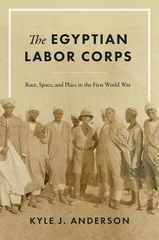
Industrial Sexuality
Gender, Urbanization, and Social Transformation in Egypt
Sara A. Whaley Book Prize, National Women's Studies Association, 2017
AMEWS Book Award, Journal of Middle Eastern Studies, 2017
Millions of Egyptian men, women, and children first experienced industrial work, urban life, and the transition from peasant-based and handcraft cultures to factory organization and hierarchy in the years between the two world wars. Their struggles to live in new places, inhabit new customs, and establish and abide by new urban norms and moral and gender orders underlie the story of the making of modern urban life—a story that has not been previously told from the perspective of Egypt’s working class.
Reconstructing the ordinary urban experiences of workers in al-Mahalla al-Kubra, home of the largest and most successful Egyptian textile factory, Industrial Sexuality investigates how the industrial urbanization of Egypt transformed masculine and feminine identities, sexualities, and public morality. Basing her account on archival sources that no researcher has previously used, Hanan Hammad describes how coercive industrial organization and hierarchy concentrated thousands of men, women, and children at work and at home under the authority of unfamiliar men, thus intensifying sexual harassment, child molestation, prostitution, and public exposure of private heterosexual and homosexual relationships. By juxtaposing these social experiences of daily life with national modernist discourses, Hammad demonstrates that ordinary industrial workers, handloom weavers, street vendors, lower-class landladies, and prostitutes—no less than the middle and upper classes—played a key role in shaping the Egyptian experience of modernity.
Industrial Sexuality is an important contribution to the fields of both Middle Eastern and gender studies...the meticulous nature of Hammad's work yields a worthy read.
Industrial Sexuality is a brilliant and highly original social history of modern Egypt. Hammad brings together Egyptian industrial workers, rural migrants, poor urban landladies, prostitutes, and elite factory owners to demonstrate complex social transformations in daily life, paying particular attention to struggles surrounding gender and sexuality, class and communal identities.
With the publication of Industrial Sexuality, Hanan Hammad secures a leading place among North America’s social historians of modern Egypt. I find the book simply breathtaking, and I can think of literally no other text on Egyptian history that provides the richly textured, ground-level account of the social dynamics of a provincial city that Industrial Sexuality provides.
Hammad’s book is a beautiful microhistory of a place, one of the best histories of labor I have ever read, and also a wonderful exemplar of gender history.
- List of Illustrations
- List of Tables
- Acknowledgments
- A Note on Translation, Transliteration, and Abbreviations
- Introduction. Townspeople, Company People, and Textiles: A Woven History
- Part One. Gendered Experiences
- Chapter 1. Competing Masculinities: Docile Workers, Aggressive Afandiyya, and the Mechanization of the Modern Subject
- Chapter 2. Urbanizing Masculinity: Workers, Weavers, and Futuwwat in Violent Alliances and Fluid Identities
- Chapter 3. Mechanizing Women: Industrial Workers or Women Adrift?
- Chapter 4. Ladies in Urban Times: Work, Property, and Gender in the Modernity of the Poor
- Part Two. Industrial Sexuality
- Chapter 5. Sexually Speaking: Unveiling the Harassment of Women, Child Molestation, Homosexuality, and Hetero-intimacy in Industrial-Urban Space
- Chapter 6. Striking and Sex-Working: Living with Tuberculosis, Syphilis, and Other Monsters
- Conclusion. The Anxiety of Transition
- Notes
- Bibliography
- Index















